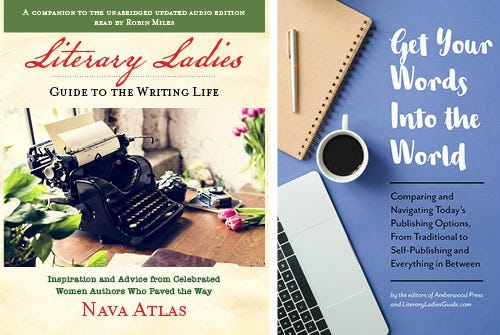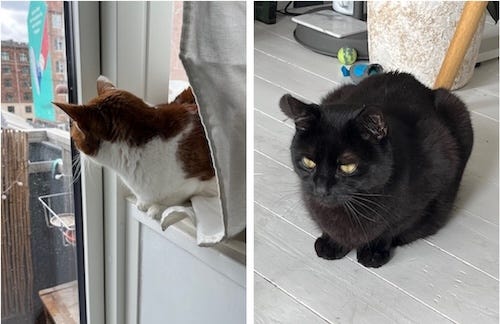How Louisa May Alcott came to write Little Women
Plus, being an introvert and being in Copenhagen
I don’t subscribe to many Substacks, but those that I enjoy most seem to have this in common: The creator pulls back the curtain to reveal a little (or sometimes a lot) about themselves. And that’s a good thing — it helps us feel connected to our fellow humans.
When I started this Substack just over a year ago, I promised readers that I’d put a bit more of myself into these posts. And I haven’t done a great job. It’s hard for me! I don’t like talking about myself!
Trying to be the best introvert I can be
I’ve always been what I consider a “friendly introvert,” that is, I have many people in my life, yet I’m also exceedingly self-contained. I’m not shy (OK, a bit shy); given the choice, I’d rather give a talk to a crowd than attend a party or event where I have to think of things to say to people I don’t know. That’s exhausting. My idea of a good time is spending hours in a library.
For writers and some other types of artists, it’s quite convenient to be an introvert; in fact, it’s often a necessity. I’m sure many creatives are burdened by the need for so much solo time, but it works well for me. Right now, I’m firmly in my bubble as I work on the final stages of a visual nonfiction book tentatively titled Women Writing Dangerously (to be published September 2026), about which I’ll be writing more after I turn in the manuscript.
Quite soon, though, I’ll be getting out of my bubble to (hopefully) do talks and presentations and Zooms about my forthcoming book, Inspired by Cats: Writers and Their Mews(es), to be published by Countryman/W.W. Norton this September. I wrote the text, highlighting 60 writers (past and present) and how their feline companions provide comfort and encouragement in what’s often a lonely profession; the illustrations are by Bob Eckstein (of The Bob).
Stay tuned; I’ll be writing more as its publication unfolds, letting readers in on the process behind the scenes. Creating a book and bringing it to fruition is a lot of (not very glamorous) work, but under the right conditions and with some luck, it can be quite gratifying.
I’ve noticed that I’m gettinh to be more of an introvert as I get older, even as I continue to amass people in my life, paradoxically. What about you, readers? Who’s an introvert? Who’s an extrovert? And who’s an extroverted introvert (and vice versa).
Why I’m in Copenhagen (Denmark) now
I’ve never met cats less interested in food than these two! My appetite isn’t great, either.
Cats! As I mentioned in last weekend’s post, my daughter and I are taking care of two cats in exchange for an apartment for two weeks. Otherwise, who could afford to be in CPH for two weeks at peak season? Fortunately, the apartment is off the beaten path in a quiet residential area.
Making our way back from the Royal Library today, my daughter and I got a glimpse of the city center, and it seemed the very definition of “overtourism.” I’d like to think we’re functioning more as temporary residents, living/working and taking care of the above cats, both easygoing boys.
About being in Copenhagen: I like it so far, but have been a bit taken aback by its big city vibes. It has a Metro (subway), trains, and buses. I couldn’t for the life of me figure the system out, but my daughter is good at this kind of thing. Plus, for me, every place on earth suffers in comparison with Reykjavik, Iceland.
OK, enough about me, let’s get to the main event …
How Louisa May Alcott came to write Little Women
It seemed that Louisa May Alcott was happiest when writing or being in the company of her sisters and beloved Marmee (that’s what she called her mom, just like in the novel). She spent the lion’s share of her waking hours writing, and though I can’t say for sure, I hope she had an introvert’s soul that affirmed her efforts.
“Overnight sensations”—writers whose first books are smash successes—are a rarity, if they exist at all; for even a stellar first effort is most often preceded by years of false starts, sweat, and toil that become invisible once the book is perched on the bestseller list. But what’s more common resembles Louisa’s experience—years or even decades of steady effort until success seems to “suddenly” arrive.
Louisa spent years cranking out thrillers, gothic novels, plays, sketches, and more than eighty articles under pseudonyms before penning her most famous novel, Little Women. It’s considered a semi-autobiographical, if highly idealized novel written from her personal experience.
This lame cover probably didn’t help …
The reception of Moods was disappointing
The first serious novel Louisa published under her real name was Moods. Published in 1864, Moods followed the solid, moderate success of Hospital Sketches, a collection of nonfiction essays about her experiences as a Civil War nurse.
Critical and public reception of this first attempt at serious fiction was disappointing, and left her discouraged. A bit weary of churning out the sensational tales that were her financial mainstay, Alcott felt for a time adrift as to her identity as an author.
In 1868, her publisher offhandedly asked that she try writing a “girls’ story” for their list. Thinking little of the request, she cranked it out in two and a half months, though her heart wasn’t in it. Neither she nor her publisher thought it was in any way remarkable. Still, it was fast-tracked, and the proof of the entire book was ready in a month or so after the author turned in the manuscript.
Here, from Louisa’s 1868 journals, is the progression of how Little Women came to be:
And so, to begin Little Women ...
May, 1868—Mr. N. wants a girl’s story, and I begin “Little Women.” Marmee, Anna, and May all approve my plan. So I plod away, though I don’t enjoy this sort of thing. Never liked girls or knew many, except my sisters; but our queer plays and experiences may prove interesting, though I doubt it.
June, 1868—Sent twelve chapters of “L.W.” to Mr. N. He thought it dull, and so do I. But work away and mean to try the experiment; for lively, simple books are very much needed for girls, and perhaps I can supply the need.
August, 1868—Roberts Bros. made an offer for the story, but at the same time advised me to keep the copyright; so I shall.
August 26, 1868—Proof of whole book came. It reads better than I expected. Not a bit sensational, but simple and true, for we really lived most of it; and if it succeeds that will be the reason of it. Mr. N. likes it better now and says some girls who have read the manuscript say it is “splendid”! As it is for them, they are the best critics, so I should be satisfied.
September 30th— First edition gone and more called for. Expects to sell three or four thousand before the new year. Mr. N. wants a second volume for spring. Pleasant notices and letters arrive, and much interest in my little women, who seem to find friends by their truth to life, as I hoped.
Little Women was an immediate success
Though Louisa had toiled for years as a writer, Little Women itself truly was an overnight success, wildly exceeding both her and her publisher’s expectations. It foretold the financial success of most, if not all her subsequent works. The post-Civil War public hungry for any work in the style that became her stock in trade.
No more anonymous thrillers for Miss Alcott! With typical self-deprecation, she described how readily she was able to sell her work to publishers after becoming a bestselling author. She wrote in an 1874 journal entry:
“Funny time with the publishers about the tale; for all wanted it at once, and each tried to outbid the other for an unwritten story … I rather enjoyed it, and felt important with Roberts, Low, and Scribner all clamoring for my '’umble' works. No more peddling poor little manuscripts now, and feeling rich with $10.”
Louisa wrote Little Women at her desk in Orchard House
Enjoying the financial rewards
For Louisa, ascending to the level at which publishers vied for her work was evidently a delicious feeling. It wasn’t long before the book made its author famous and brought her the financial ease she had long craved, especially for the ability to take care of her family (she, not her parents, had been the breadwinner since her teens).
“Over a hundred letters from boys & girls,” commented Louisa in 1872, “& many from teachers & parents assure me that my little books are read & valued in a way I never dreamed of seeing them. This success is more agreeable to me that money or reputation.”
From the sales of Little Women and its sequels, Alcott did amass what was a small fortune for its time. However modestly she viewed her talent, she didn’t shy away from claiming her financial due, and when success arrived, it was sweet indeed.
You may also like …
A Substack anniversary offer!
This month is the one-year anniversary of Literary Ladies Guide on Substack! It has been such a gratifying year. To celebrate, I’m offering free subscribers a 10% discount (off the already reasonable price) to upgrade to monthly or yearly subscriptions through the end of June (and I think if you’re renewing you’ll get the same discount). Please join me in growing this community, and supporting my efforts to elevate women’s voices. Simply choose your plan to subscribe here.










Friendly introvert too. Congratulations on your books current and future! I like the working title of the new one! Really enjoyed the journal entries. I loved Alcott and read all her books when I was a kid. Books I loved when young are still comfort reads, many of them.
Happy anniversary! And congrats on the upcoming books. I, too, have been inspired by Louisa May. I love how you remind us how hard she worked before her bring break. She did much to support her family. P.S. I'm an ambivert - a mix between and introvert and an extrovert, but when it comes to writing, I'm a total introvert.